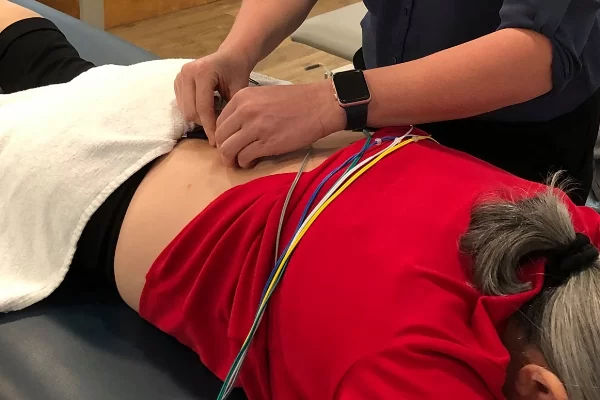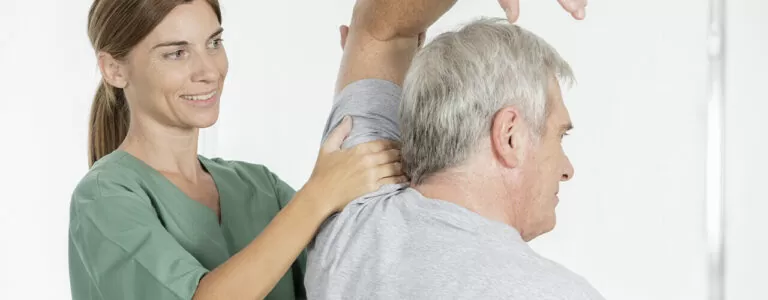Shoulder Pain
If you’ve ever suffered from a shoulder injury, you know how painful and debilitating it can be. Even simple everyday tasks such as pushing, pulling and reaching can take a toll on your shoulders. It’s important to contact a physical therapist if you’re suffering from shoulder pain. Call us today to set up an appointment to see one of our physical therapists.
Not only can the pain hinder your ability to perform daily activities, but it may be a sign that you have a deeper injury. A physical therapist can evaluate your shoulder and create a treatment plan for your specific condition. Getting the right treatment as quickly as possible is necessary to maintain maximum mobility.
What Is Shoulder Pain?
The National Institutes of Health states that there are several different types of shoulder conditions that can cause pain:
- Frozen Shoulder – This condition includes stiffness and pain in the shoulder joint. A frozen shoulder will often go through a variety of stages that may occur over several years. You will likely feel achy, dull pain when suffering from a frozen shoulder.
- Shoulder Dislocation – This occurs when the shoulder socket and the ball of the arm separate. A traumatic event such as an accident or a fall can cause this condition. You would likely feel immediate pain and would have difficulty moving your arm.
- Rotator Cuff Injury – The rotator cuff in your shoulder is made of tendons and muscles. Bursitis, tendonitis and tears can all occur in this particular area.
How Physical Therapy Can Help Shoulder Pain
If you’re experiencing pain or injury in your shoulders, a physical therapist at Rehab Dynamics can evaluate your range of motion and functional abilities. Your therapist would then put together an individualized treatment plan to relieve pain and restore mobility. Other goals would include reducing inflammation, decreasing muscle spasms and increasing the healing process. There are several methods we could use during treatment:
- Strengthening and stretching exercises
- Heat or ice treatments
- Manual therapy
- Electrical stimulation
- Laser Therapy
- Dry Needling
Causes of Shoulder Pain
There are several reasons why you could experience an injury or pain in your shoulders. According to the Mayo Clinic, risk factors for frozen shoulder include having diabetes and having your shoulder immobilized for long periods, such as after a fracture.
Rotator cuff injuries occur most frequently in individuals who move their arms in overhead motions. These repetitive motions are often performed on the job or during sports activities. Sometimes, however, rotator cuff injuries are the result of a single incident.
A dislocated shoulder is when the arm bone actually pops out of the socket in the shoulder blade. This condition is often the result of a fall, a traumatic accident or a sports injury.
Many people can recover from various types of shoulder conditions without having surgery. Physical therapy can play a major role in your recovery without having to use invasive methods. Even if surgery is required, physical therapy can help you both before and after to improve healing time and increase your range of motion.
Our physical therapy team has the experience and expertise to help you heal from a variety of shoulder conditions. They work to reduce pain, increase mobility and help you resume your regular activities as quickly as possible. Whether it’s a rotator cuff injury, a dislocated shoulder or any other type of shoulder injury, your physical therapist can help you improve mobility and get you back to participating in your daily activities. Contact Us Today at Covington & Mandeville, LA Centers or make an appointment below. You don’t have to live with ongoing shoulder pain!
FAQs
What is the most common shoulder injury?
Sprains and strains are among the most commonly experienced overuse injuries in the shoulder area. A strain occurs when a muscle or tendon is stretched too far or torn. A sprain occurs when a ligament is stretched too far or torn. Strains and sprains can result in an ongoing shoulder pain that may make it difficult to partake in exercise or even daily tasks. If the strain or sprain is minor, it can sometimes be iced at home and healed with rest. More severe strains and sprains will often require physical therapy treatments. Additional shoulder injuries include a torn cartilage, dislocation, tendinitis, frozen shoulder, and arthritis.
How do you know if my shoulder injury is serious?
Your shoulders can accomplish several physical feats due to their structure – however, this also means that they are susceptible to an increased risk of injury because of their complexity. If something becomes damaged in the make-up of the shoulders, pain and discomfort can develop. This pain may range from a dull ache to shooting pains, depending on the severity of the condition. If you are experiencing severe pain, or pain lasting three months or longer, it could be indicative of a deeper issue.
How do I get my shoulder to stop hurting?
If your shoulder is causing you discomfort, physical therapy is the best way to ensure the highest rate of relief. Our physical therapists are highly trained to help improve the flexibility and range of motion in your shoulder, in addition to relieving your pain and discomfort. This will be done through an individualized treatment plan designed specifically for you, and may include any combination of treatment methods as your physical therapist deems fit, including manual therapy, ice and heat therapies, electrical nerve stimulation, or ultrasound. Your physical therapist will also prescribe targeted exercises and stretches to help regain your optimal shoulder function.
How can physical therapy help with shoulder pain?
Two of the biggest goals of physical therapy are 1) to alleviate your pain and 2) to improve your function. Your physical therapist will work with you to make sure that both of these are achieved throughout your physical therapy sessions. Physical therapy has been proven to manage the pain of several conditions, and in many cases, it has even been proven to eliminate shoulder pain altogether, thus making the need for harmful drugs or surgical intervention obsolete.
"After completing my physical therapy treatment, I am able to hold my 20 pound grand baby for the first time!"
"-Carolyn B."






